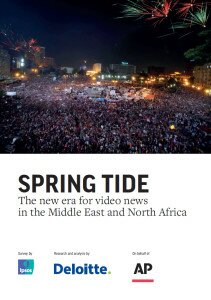There is a strong appetite in the Middle East for high-quality news content in different formats and a desire to see trustworthy news from a number of different perspectives, according to a new survey carried out by Deloitte on behalf of The Associated Press.
Entitled “Spring Tide: The new era for video news in the Middle East and North Africa,” the report examines the state of the news market in the region and suggests ways it needs to evolve.
The survey of 18 to 45-year-olds in the United Arab Emirates, Egypt and Saudi Arabia reveals a thriving market where 97% of consumers regularly discuss news and current affairs in their daily lives. Forming a vital part of the social fabric, news is consumed by audiences in the region for an average of 72 minutes per day, longer than their counterparts in the U.K., Germany and Japan.
The research also shows that the Middle East audience is not always well served by the existing news supply, presenting a substantial opportunity for news providers. Trust is most important to consumers in the Middle East, with almost a third of respondents identifying it as paramount when choosing a news provider. This differed from previous survey respondents in Europe and Asia for whom speed was the most significant factor.
Quality is also important for Middle East consumers, particularly when it comes to video content. Despite identifying a preference for locally produced content, more than half of respondents believe that international TV content is a better source of news because of better quality video clips. This is highlighted further by the fact that 75% of those surveyed are more likely to access a news story if it has an accompanying video, and that video consumers have a higher dwell time on news content each day. For 83% of Middle East consumers, video clips also improve their overall understanding of content.
When it comes to the content itself, a broad mix of stories resonates. Lighthearted stories are important, as is international news; with political news stories remaining the most commonly accessed (by 80% of respondents). Most significant for broadcasters though is the 63% of consumers expressing a desire for increased coverage of regionally-focused stories. Demand to access regional content in addition to — rather than instead of — international news indicates the region is a particularly engaged consumer of news.
The findings also suggest that the rise of social media is changing consumers’ online behavior. 70% of respondents use social media for news more today than they did last year, and 59% discover the majority of news this way. However, the research also indicates that TV remains important for finding out more on a story once it has broken, with 43% accessing it first to get more information.
“The new study gives us a much deeper understanding of Middle East news consumers and how the industry needs to adapt to meet their needs,” said Ian Phillips, Middle East director of news for AP. “For example, it’s critical to understand the trends in news consumption habits, particularly when it comes to video and the use of social media. The demand for better quality video and more regional news also presents a number of opportunities, while the increased use of social media suggests the need for new and innovative strategies to drive audiences back to online news sites.”
Matthew Guest, head of digital strategy for Deloitte Europe, added: “We were really excited to carry out research in a market that is evolving incredibly fast on both the supply and demand side. The findings highlight a series of exciting opportunities for news providers, particularly for local outlets that are in a position to produce a richer, more cultural output for audiences. The Middle East is flourishing and news providers need to ensure that supply balances with demand in the future.”


It’s true that the old “loop the loop” system od Middle East news is gone now, thanks largely to electronic mail, but it brings its own problems. Where is the incentive for a freelance investigative journalist to produce original material, when it might only earn a lineage fee from an online publisher, and finds the story repeated throughout the world with no additional reward? And the shortage of reliable original work still means that A copies from B, and C copies from B, and if challenged, A gives B and C as its provenance for the truth of the story. The only safe way is to trace back the origin of the story and the dateline, and to check if possible whether that origin is a news source or propaganda.